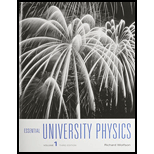
Essential University Physics (3rd Edition)
3rd Edition
ISBN: 9780134202709
Author: Richard Wolfson
Publisher: PEARSON
expand_more
expand_more
format_list_bulleted
Concept explainers
Question
Chapter 39, Problem 58P
To determine
How a person will argue with a friend who claims the universe to be less than
Expert Solution & Answer
Want to see the full answer?
Check out a sample textbook solution
Students have asked these similar questions
2
3
Imagine you are out for a stroll on a sunny day when you encounter a lake. Unpolarized light from the sun is reflected off the lake into your eyes. However, you notice when you put on your vertically polarized sunglasses, the light reflected off the lake no longer reaches your eyes. What is the angle between the unpolarized light and the surface of the water, in degrees, measured from the horizontal? You may assume the index of refraction of air is nair=1 and the index of refraction of water is nwater=1.33 . Round your answer to three significant figures. Just enter the number, nothing else.
Chapter 39 Solutions
Essential University Physics (3rd Edition)
Ch. 39 - Prob. 1FTDCh. 39 - Prob. 2FTDCh. 39 - Prob. 3FTDCh. 39 - Prob. 4FTDCh. 39 - Prob. 5FTDCh. 39 - Prob. 6FTDCh. 39 - Prob. 7FTDCh. 39 - Prob. 8FTDCh. 39 - Name the fundamental force involved in (a) binding...Ch. 39 - Prob. 10FTD
Ch. 39 - Prob. 11FTDCh. 39 - Prob. 12FTDCh. 39 - Prob. 13FTDCh. 39 - Prob. 14FTDCh. 39 - Describe the origin of the cosmic microwave...Ch. 39 - Prob. 16FTDCh. 39 - Prob. 17FTDCh. 39 - The radiation that we observe as the cosmic...Ch. 39 - Prob. 19FTDCh. 39 - Prob. 20FTDCh. 39 - Prob. 21ECh. 39 - Prob. 22ECh. 39 - Prob. 23ECh. 39 - Prob. 24ECh. 39 - Prob. 25ECh. 39 - Prob. 26ECh. 39 - Prob. 27ECh. 39 - Prob. 28ECh. 39 - Prob. 29ECh. 39 - Prob. 30ECh. 39 - Prob. 31ECh. 39 - Prob. 32ECh. 39 - Prob. 33ECh. 39 - Prob. 34ECh. 39 - Prob. 35ECh. 39 - Prob. 36ECh. 39 - Prob. 37ECh. 39 - Prob. 38PCh. 39 - Prob. 39PCh. 39 - Prob. 40PCh. 39 - Prob. 41PCh. 39 - Prob. 42PCh. 39 - Prob. 43PCh. 39 - Prob. 44PCh. 39 - Prob. 45PCh. 39 - Prob. 46PCh. 39 - Prob. 47PCh. 39 - Prob. 48PCh. 39 - Prob. 49PCh. 39 - Prob. 50PCh. 39 - Prob. 51PCh. 39 - Prob. 52PCh. 39 - Prob. 53PCh. 39 - Prob. 54PCh. 39 - Prob. 55PCh. 39 - Prob. 56PCh. 39 - Prob. 57PCh. 39 - Prob. 58PCh. 39 - Prob. 59PCh. 39 - Prob. 60PCh. 39 - Prob. 61PPCh. 39 - Prob. 62PPCh. 39 - Prob. 63PPCh. 39 - Prob. 64PP
Knowledge Booster
Learn more about
Need a deep-dive on the concept behind this application? Look no further. Learn more about this topic, physics and related others by exploring similar questions and additional content below.Similar questions
- 20. Two small conducting spheres are placed on top of insulating pads. The 3.7 × 10-10 C sphere is fixed whie the 3.0 × 107 C sphere, initially at rest, is free to move. The mass of each sphere is 0.09 kg. If the spheres are initially 0.10 m apart, how fast will the sphere be moving when they are 1.5 m apart?arrow_forwardpls help on allarrow_forwardpls help on thesearrow_forward
- pls help on all asked questions kindlyarrow_forwardpls help on all asked questions kindlyarrow_forward19. Mount Everest, Earth's highest mountain above sea level, has a peak of 8849 m above sea level. Assume that sea level defines the height of Earth's surface. (re = 6.38 × 106 m, ME = 5.98 × 1024 kg, G = 6.67 × 10 -11 Nm²/kg²) a. Calculate the strength of Earth's gravitational field at a point at the peak of Mount Everest. b. What is the ratio of the strength of Earth's gravitational field at a point 644416m below the surface of the Earth to a point at the top of Mount Everest? C. A tourist watching the sunrise on top of Mount Everest observes a satellite orbiting Earth at an altitude 3580 km above his position. Determine the speed of the satellite.arrow_forward
- pls help on allarrow_forwardpls help on allarrow_forward6. As the distance between two charges decreases, the magnitude of the electric potential energy of the two-charge system: a) Always increases b) Always decreases c) Increases if the charges have the same sign, decreases if they have the opposite signs d) Increases if the charges have the opposite sign, decreases if they have the same sign 7. To analyze the motion of an elastic collision between two charged particles we use conservation of & a) Energy, Velocity b) Momentum, Force c) Mass, Momentum d) Energy, Momentum e) Kinetic Energy, Potential Energyarrow_forward
arrow_back_ios
SEE MORE QUESTIONS
arrow_forward_ios
Recommended textbooks for you
 AstronomyPhysicsISBN:9781938168284Author:Andrew Fraknoi; David Morrison; Sidney C. WolffPublisher:OpenStax
AstronomyPhysicsISBN:9781938168284Author:Andrew Fraknoi; David Morrison; Sidney C. WolffPublisher:OpenStax Stars and Galaxies (MindTap Course List)PhysicsISBN:9781337399944Author:Michael A. SeedsPublisher:Cengage Learning
Stars and Galaxies (MindTap Course List)PhysicsISBN:9781337399944Author:Michael A. SeedsPublisher:Cengage Learning Foundations of Astronomy (MindTap Course List)PhysicsISBN:9781337399920Author:Michael A. Seeds, Dana BackmanPublisher:Cengage Learning
Foundations of Astronomy (MindTap Course List)PhysicsISBN:9781337399920Author:Michael A. Seeds, Dana BackmanPublisher:Cengage Learning
 An Introduction to Physical SciencePhysicsISBN:9781305079137Author:James Shipman, Jerry D. Wilson, Charles A. Higgins, Omar TorresPublisher:Cengage Learning
An Introduction to Physical SciencePhysicsISBN:9781305079137Author:James Shipman, Jerry D. Wilson, Charles A. Higgins, Omar TorresPublisher:Cengage Learning Principles of Physics: A Calculus-Based TextPhysicsISBN:9781133104261Author:Raymond A. Serway, John W. JewettPublisher:Cengage Learning
Principles of Physics: A Calculus-Based TextPhysicsISBN:9781133104261Author:Raymond A. Serway, John W. JewettPublisher:Cengage Learning

Astronomy
Physics
ISBN:9781938168284
Author:Andrew Fraknoi; David Morrison; Sidney C. Wolff
Publisher:OpenStax

Stars and Galaxies (MindTap Course List)
Physics
ISBN:9781337399944
Author:Michael A. Seeds
Publisher:Cengage Learning

Foundations of Astronomy (MindTap Course List)
Physics
ISBN:9781337399920
Author:Michael A. Seeds, Dana Backman
Publisher:Cengage Learning


An Introduction to Physical Science
Physics
ISBN:9781305079137
Author:James Shipman, Jerry D. Wilson, Charles A. Higgins, Omar Torres
Publisher:Cengage Learning

Principles of Physics: A Calculus-Based Text
Physics
ISBN:9781133104261
Author:Raymond A. Serway, John W. Jewett
Publisher:Cengage Learning